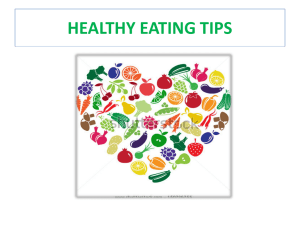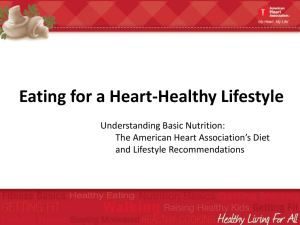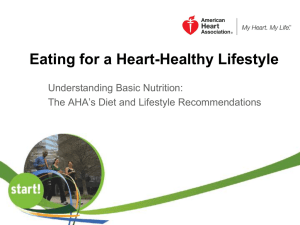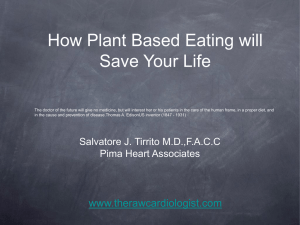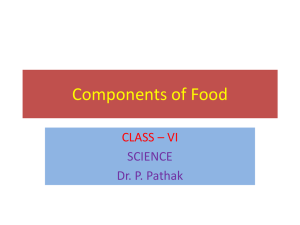Diet and Lung Disease
advertisement
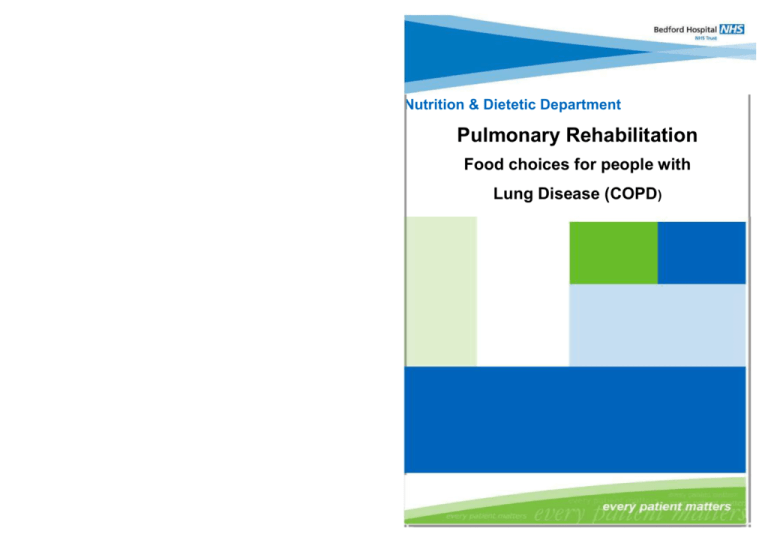
Nutrition & Dietetic Department Pulmonary Rehabilitation Food choices for people with Lung Disease (COPD) Diet and Lung Disease Eating well when you have lung disease (COPD) can help you to feel better. Breathing may require more energy for people with lung disease. The muscles used in breathing may require more calories than those of a person without lung disease. NOTES Being overweight, your heart and lungs have to work harder, making breathing more difficult. In contrast, being underweight might make you feel tired and more prone to infections. The treatments of lung disease can lead to either an increase or a decrease in your appetite, both of which have their own individual problems. Steroids If you are taking steroids, possible side effects may include weight gain due to an increased appetite, high blood pressure and possibly diabetes. By following a sensible healthy eating pattern you could help reduce some of the symptoms associated with these problems. Carrying excess weight will make your breathing more difficult and reduce your level of activity, which makes breathing even more difficult. Diabetes High doses of steroids can cause diabetes. Diabetes is where the body cannot control the level of sugar in the blood, leading to raised blood sugar. This can cause symptoms such as feeling thirsty, passing urine more often and feeling tired. Maintaining a healthy weight and following a healthy eating pattern will help to relieve symptoms. Produced by the Dietitians at Bedford Hospital 01234 792171 Or email dietetics@bedfordhospital.nhs.uk Further information on diabetes is available from the Dietitians. 2 11 Where do you store the cartons? Calcium and Osteoporosis Choose a cool place, not next to a heater or radiator. Once opened keep at room temperature for no more than 4 hours. Open cartons can be kept in the fridge for 24 hours. Osteoporosis or thinning of the bones can occur if you take steroids for a long time. To help prevent this it is important to eat enough foods that are high in calcium. Fill in the calcium score to check your intake. If you cannot manage the supplement contact the person who recommended them, for advice. Good sources of Calcium are: Further information on Calcium in foods is available from the Dietitians. Why not try some homemade or shop bought high protein, high calorie drinks -Milk -Cheese Use your fortified milk to make hot chocolate, Horlicks or coffee. Double cream can be added to a hot milky drink. Milkshakes made with cordials, fruit juice, milk shake syrup or powder. Add a scoop of ice cream for extra nourishment. Fizzy drinks e.g., Lucozade, Appetizer, Schloer, Lemonade, and Coca Cola. Try to avoid ‘low calorie’ and ‘diet’ options. -Yoghurt -White bread -Calcium fortified soya milk -Sardines (including the bones) -Green vegetables Food Choices Dietary advice will be discussed under the following headings: Health Eating – for those who want to maintain or lose weight A high protein, high calorie diet (with or without supplements) is only temporary until your breathing and your weight improve. Once you achieve this, you should return to following a healthy eating pattern again. 10 High Calorie / High Protein Diet – for those who are underweight and need to gain weight or are losing weight unintentionally. 3 Healthy Eating Having a healthy diet can help maintain a healthy weight, blood pressure and, help control blood sugar levels if you have diabetes. Good nutrition helps prevent infections. Chest infections may lead to hospitalisation for people with lung disease. So it is important to reduce your risk of infection by following a healthy diet. The principles of a healthy diet are: Eat a variety of different foods Eat plenty of fruit and vegetables Have less salt, sugar and fat Have more fibre Drink enough fluids The following picture illustrates what a healthy, balanced diet looks like. Include foods from each of the five groups How much should you take? The person recommending the supplement will suggest how much to take each day. How should you take the supplement? Take between or after meals or before bedtime so it does not affect your appetite. Sip slowly to avoid feeling overfull. If the whole carton is too much to take in one go, have small amounts regularly, storing the open carton in the fridge. Chilled supplements may be nicer so it may be worth keeping some in the fridge. You can warm supplements drinks. Do not warm in the carton and do not boil. Mix juice style cartons with lemonade or soda for a refreshing drink, or freeze as ice-lollies. Can you use the supplements in cooking? Try freezing them to make an ice cream or fruit ice. Whip a milk based supplement with equal amounts of whipped cream and freeze to make a softer dairy ice cream. Use a fruit juice supplement to make up a jelly. Use a milk based supplement to make up an instant whip. 9 High Calorie Foods Add sugar to drinks, puddings, breakfast, cereals, etc. Do not choose low calorie or diet products. Fatty and fried foods are a good, concentrated energy source. Use butter or margarine (not low fat spread) on bread, crackers, vegetables and potatoes. Add cream to soups, puddings, sauces, fruit, breakfast cereals, etc. Avoid drinking with meals as this may fill you up and spoil your appetite. Try not to get out of the habit of eating. You actually need to stimulate your appetite. tips Have less fat Avoid all fried foods. Grill, bake, poach, steam, microwave or instead. Avoid eating fat from meat and chicken skin. Reduce meat portions to 2 – 3oz (60 – 90g) lean meat. 4 – 5 oz (120 – 150g) fish or chicken per serving. Use low fat products e.g. low fat spread, semi-skimmed or skimmed milk. Supplement Drinks Have less fatty foods like chocolate, cakes, biscuits, pastries and pies. If you are losing weight you will need extra nourishment. If you are taking a high calorie diet but still struggle to gain weight you may be advised to take nutritional supplements. There are many different types available: Avoid adding lots of fat (e.g. spreads, oil) to foods. Non-prescribable – for example Build-Up or Complan, these come in both sweet and savour flavours and are made up with milk or water. They are widely available in supermarkets and chemists. Prescribable – these can be divided into: Milk based, eg Ensure Plus, Fortisip, Scandishake Yoghurt style, eg Ensure Plus Yoghurt style Fruit juice based, eg Enlive Plus, Provide Xtra, Fortijuce Mousse type, eg, Clinutren desserts, Forticreme Others, eg Calogen (taken as a medicine). Maxijul (added into foods) 8 .Healthy eating Have less sugar Choose diet or sugar-free drinks and products. Cut down on sweets, chocolates, biscuits, and puddings. Avoid adding sugar to foods – use sweeteners instead. Increase the amount of fibre in your diet Choose wholemeal or whole wheat products. Include plenty of fruit and 5 vegetables. Increase your fluid intake when increasing your fibre. Watch your salt intake Use less salt in cooking. Avoid adding salt at the table. There is no benefit from using salt substitutes Use alternatives like herbs and spices to flavour foods By opting for a healthier eating plan you should still be able to include some of the foods that you enjoy, but less frequently. Do not worry if you have a “bad day”; continue with the healthier options after. Weight loss If you need to lose weight, ideal weight loss is around 1 – 2 lbs per week. If you lose it slowly you are more likely to keep it off. Unplanned weight loss leads to a loss of muscle mass, which can have a negative effect. If you lose a lot of weight quickly, which maybe unplanned, it is advisable to see a Dietitian. High Calorie, High Protein Diet Sometimes breathlessness can make it difficult for people to maintain or gain weight. Breathing problems can lead to unplanned weight loss. You may find if difficult to eat your usual amount of food due to increased breathlessness. The condition may also mean you need more calories than normal. For whatever reason, if you need to gain weight, then following a high protein, high calorie diet can help achieve this. 6 If you are not eating as well as you would normally, the following tips may help you to eat more: Continue to have a balanced diet as explained in the healthy eating section, and include fruit, vegetables and fruit juices. As these foods are low in calories, try not to fill up on them. Small, frequent meals or snacks will be easier for you to manage than 3 large meals and can be equally nutritious e.g., every 2-3 hours. Include milky puddings daily. Try not to spend too long preparing meals. Tinned, packet or readymade meals such as canned milk puddings, creamy thick yoghurts, soups, etc are ideal. Protein foods Include foods that are high in protein with every meal Have 1 pint of full cream milk every day. You can fortify this by adding 4 tablespoons of milk powder, such as ‘marvel’ or ‘5 pints’. Use it as normal in cooking and drinks. Meat, fish, chicken, eggs, cheese, nuts, beans, peas and other pulses are all good sources of protein. Include in your meals and snacks. Cheese is useful to melt into sauces, soups, omelettes, vegetables etc, to increase both protein and energy. 7
